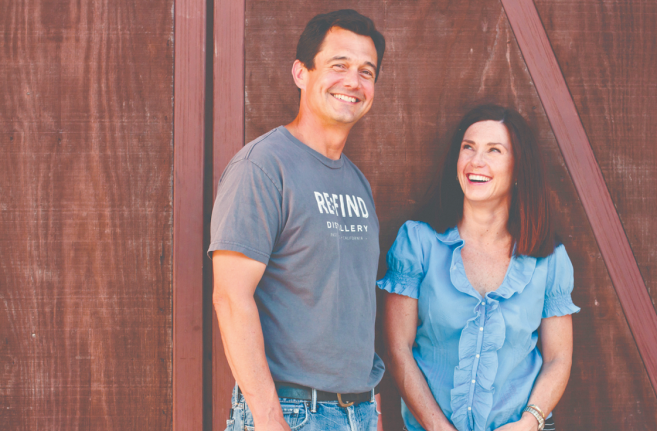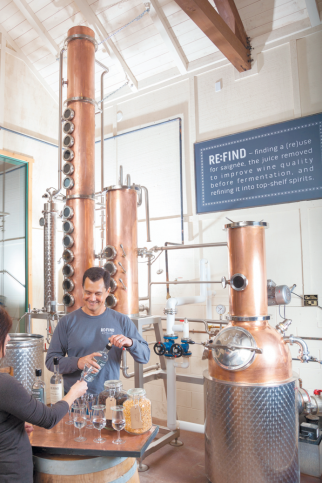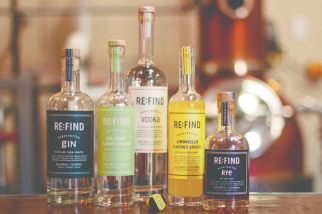
Re:Find Distillery: Waste Not, Want Not
]Blood. That’s what the winemaking process of saignée references: bleeding grapes for extra color and structure, and letting the costly juice run, quite literally, down the drain.
For Alex Villicana, the metaphor was painfully appropriate. He and his wife, Monica, had staked their livelihood on planting 13 acres of vines on Paso Robles’ west side, coddling their grapes, spending hours on tractors, and putting all of their time and energy toward the very expensive dream of making wine. So when it came time for saignée, they were heartbroken to watch anywhere from 10% to 30% of their premium Rhône-varietal juice go to waste.
“Saignée is an important process for the production of quality wines, but it seemed really wasteful,” says Alex. They looked into recouping the run-off juice by bottling it as pure grape juice or making it into traditional brandy, but both options proved time- and cost-prohibitive. And then Alex read an article on vodka.
“He read that vodka can be made from anything fermentable to 95% alcohol by volume,” says Monica. “That got us wondering, ‘Would distilling grape juice work? Would the county allow us to make spirits? Could we pay for the process? And would we be allowed to sell it?’”
Coincidentally, just as the Villicanas’ idea was unfolding, a loophole opened up in California legislation allowing wineries to sell brandy, which is rather loosely defined as any spirit crafted from grapes. Seizing their opportunity, the Villicanas launched Re:Find Distillery as a sister business to Villicana Winery, becoming the Central Coast’s first operational distillery and one of the few American distilleries to be founded on grape-based spirits.

Having invested in a custom-manufactured still from Stuttgart, Germany, the Villicanas began by crafting vodka and gin through a four-distillation process. Today, the Re:Find lineup has grown to include cucumber vodka made with locally grown cucumbers, limoncello from local lemons, and rye whiskey, which is the only non-grape-based spirit. Each of these products is superlatively good, but Re:Find gin is the one that has taken mixologists and cocktail enthusiasts by storm.
“Our gin is the most fun to make,” says Alex, who approached the botanical seasoning process as he would a wine blend. After several trials, he landed on a proprietary recipe that includes traditional juniper, as well as less-expected flavors like lavender, iris root (a lovely and earthy aromatic), lemon and orange peel, Grains of Paradise and coriander. The result is a fresh, clean, close-to-the-source gin that elevates a simple gin and tonic to a full-flavored, multi-sensory experience.[/vc_column_text][/vc_column_inner][/vc_row_inner][vc_column_text]When the distillery opened in 2011, the Villicanas bottled 1,000 gallons of spirits; just two years later, they bottled 23,000 gallons, equating to the output of 50 acres of premium wine grapes that would have otherwise been discarded. (No longer using only their own saignée juice, the Villicanas now buy “wasted” free-run juice from neighboring wineries to produce spirits.)
Such rapid growth in a new product has presented the Villicanas with some unique challenges. For instance, mobile bottling lines like those that bottle wine don’t carry insurance for highly flammable spirits. “The first year we distilled, a bottling truck turned us away because it wasn’t ‘explosion proof.’ That’s why we hand-bottle everything—out of necessity.”

Also, as grape-based products, Re:Find spirits are seasonal, dependent on the grape harvest in fall.
“Harvest is already wild for winemakers, but up here, it’s insane,” says Alex, “because we’re processing wine and spirits at the same time.”
Headaches aside, Re:Find spirits hold a special place in the beverage industry and agriculture at large, partly for their creativity and commitment to sustainability, but also because on the palate, each sip is smooth, clean and soft, without any of the harshness that accompanies most spirits (and causes the imbiber to wince in pain).
“That’s the effect of high glycerol in grapes,” says Alex. “In grain-based spirits the glycerol content is 6% to 10% percent, but in grapebased spirits it’s double that. Glycerol bonds with alcohol and the higher the content, the smoother the mouthfeel.” The high quality of RE:Find spirits also points to their origins in meticulously tended Paso Robles vineyards.
“I’ve been making wine for 20 years,” says Alex, “so I know that the wine these spirits are coming from is extremely good. It makes sense that if your upfront materials are quality, you’re already halfway to a quality distilled product.”
Re:Find spirits are available in retail shops across the Central Coast, as well as fine establishments like La Cosecha Bar + Restaurant in Paso Robles, where all five Re:Find spirits are available in distinctive, flavorful cocktails. To discover cocktail recipes crafted especially for Re:Find and to learn about their spirits club, visit ReFindDistillery.com.

